Improving the chances of cure for childhood cancer in Brazil

For a country like Brazil, having childhood cancer as the leading cause of death by disease among children and adolescents represents an advancement, even though this statement might not seem to make sense at first. The reason is that this serious indicator points to an important breakthrough: the drastic reduction of infectious parasitic diseases in the 2000s, which were previously the main causes of infant mortality in the country.
Despite being a rare disease, childhood cancer is a big challenge in a country with continental dimensions like Brazil. This is due to the huge regional disparities and social differences that are reflected in access to treatment, and the stagnation of childhood cancer mortality rate at a high level of about 42% from 2000 to 2019 (according to information collected by the Desiderata Institute for the Panorama of Pediatric Oncology). During that same period, the childhood cancer mortality rate in the US was reduced from 28% to 22%.
Even though a comparison of the annual childhood cancer mortality rate between Brazil and the US is not particularly relevant, given that these are countries at different levels of economic and social development, what is striking about this data is that the Brazilian situation has remained stagnant for so long.

Instituto Desiderata has been working to improve public policies for childhood cancer in Rio de Janeiro since 2003, and more recently has broadened its scope. In 2021, it held the 6th Pediatric Oncology Forum, in collaboration with PAHO, SOBOPE, CONIACC, INCA and St. Jude Children's Research Hospital. On that occasion, we launched the Panorama of Pediatric Oncology, presenting data related to incidence, mortality, pediatric care, and records from all parts of the country, revealing the regional disparities in Brazil.
However, Desiderata’s movements for national action did not start just now. The first seeds planted for this national vision were UICC’s international cooperation programmes, when I joined the Young Leaders Program in 2017 and started exchanging experiences with other leaders working in the area and interested in Brazil’s situation.
Participating in the World Cancer Leaders’ Summits in Mexico, Malaysia and Kazakhstan also made me reflect on the scenario of pediatric oncology in Brazil and Latin America in comparison with other countries. When I was in Malaysia in 2018, I had the opportunity to present Unidos pela Cura, an initiative to promote the early diagnosis of childhood cancer in Rio de Janeiro. I was soon invited to participate in a meeting of the Global Initiative for Childhood Cancer (GICC), led by the World Health Organization (WHO), where Dr Carlos Rodriguez-Galindo from St. Jude Children's Research Hospital and Dr André Ilbawi from WHO were present.
Since then, I have continued to participate in UICC events, and in 2019 held a meeting to present the GICC in Brazil. This happened during the 5th Pediatric Oncology Forum in Rio de Janeiro, with the presence of Dr. Carlos Galindo and pediatric oncologists from various Brazilian states, as well as those from other countries such as Italy, Chile and Peru. It was at this Forum that it became clear to me that it was necessary to create a space for national planning to promote greater and more equitable chances of curing cancer in children.
During this Golden September of Childhood Cancer Awareness Month, Desiderata celebrates the expansion of its activities after organising the 6th Pediatric Oncology Forum and the first edition of the National Panorama of Pediatric Oncology, as well as our participation and articulation with the GICC. Today, in 2021, we can reap the first benefits of these collaborations and envision a favorable period for the development of pediatric oncology care policies in Brazil.
Childhood cancer is a disease of low prevalence that requires high expertise to be curable. Brazil has the necessary conditions to advance in this field, due to both the extent and reach of its primary health care system throughout the country and its specialised centers of excellence in treatment.
Several actions in favor of childhood cancer treatment have been carried out in Brazil, and all of us – as a country, as individuals, as organisations – must take advantage of this moment to join forces and progress in an integrated and connected agenda.
To this end, I would like to highlight the dedication of the PAHO team at the GICC in Brazil, which has been in close dialogue with the Ministry of Health, INCA, SOBOPE, and renowned pediatric oncologists united by a common goal: to increase the chances of cure and reduce preventable deaths due to childhood cancer. Finally, all of us at Instituto Desiderata continue to advance in our commitment to ensure that all Brazilian children and adolescents with cancer have the same chances of cure.
Last update
Thursday 16 September 2021Share this page






